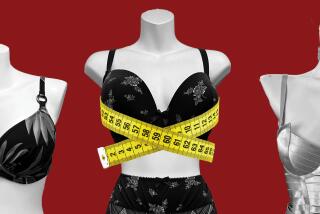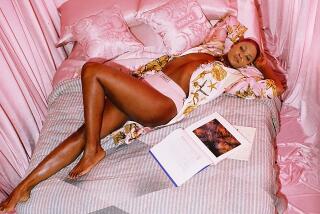When Saudi Women Want Intimate Apparel, They Must Ask Men to Help
- Share via
RIYADH, Saudi Arabia — The Saudi woman, swathed in black with only her eyes showing, held up a lacy orange bra and asked the salesman in a whisper if he had her size.
“Did you say 36C?” the man replied, loudly enough for other customers to hear. “Are you sure you don’t need a bigger size?”
“It was 36C in the past,” said the woman.
“Well, the past changes,” responded the salesman.
It’s not the kind of exchange one might expect in Saudi Arabia, where the sexes are segregated by an unwritten but stringent code. But when it comes to lingerie, women often must discuss their most intimate details with strange men.
The reason is that in most stores, only men are allowed behind the counter.
The alternative is women-only shopping centers, of which there are few, or self-service department stores, where the selection is narrower.
And once outside the house, women may only be seen as shapeless forms under black cloaks called abayas. A visible hand, jeans-clad leg or strand of hair can bring trouble from the muttawa, the powerful religious police.
At social functions such as weddings, where the sexes are segregated in different halls, women can wear strapless evening dresses -- but they must arrive covered up and can only reveal their finery once they are in the women-only hall.
The subject rouses much passion among women.
“Society covers you up and the salesman strips you down,” said Gihan Ramadan, an online editor for Arab News daily. “It’s outrageous. Nothing could be more humiliating.”
Mohammed bin Abdullah al-Hawwas wrote to the newspaper Al Watan recently about accompanying his wife to a store and seeing her “engaged in a very private conversation with a strange man about her body measurements.... I couldn’t take it and I pulled my wife out.”
Jehayeir Muassaid, a writer who has tackled this issue in Al Riyad newspaper, was particularly incensed about a two-week book fair that women were allowed to visit on only two half-days, closely watched by muttawa agents.
The reason given was that the vendors were men, Muassaid said.
“What makes me livid is that it’s OK for a woman to buy underwear from a man who pulls and stretches each piece to show her how it can accommodate a certain body part and then rubs it to show her how she can wash out stains, but it’s not OK for her to buy from a man a book that would enrich her as a person,” she added. “What kind of logic is that?”
The same logic, apparently, allows lingerie store windows to display full-busted mannequins in skimpy underwear and sheer nightgowns.
On a recent morning, a muttawa agent scolded a reporter at a mall for not wearing a head cover. Walking behind her, he delivered a tirade interspersed with verses from the Koran, Islam’s holy book. “Stop the defiance! Don’t come to the souq uncovered!” he barked as he strode past a lingerie store displaying a blown-up picture of a denim bra and a mannequin dressed in a dark pink thong and matching skimpy nightgown.
Store windows are one thing, makeup stands another. These may not display pictures of women’s faces that promote creams, eyeshadow and lipsticks.
Some stands defy the ban. At one, a staffer keeps a blank sheet of paper to cover the pictures in case the religious police show up. Another was less lucky with the same strategy. The muttawa caught him before he could cover the photos and ripped them up.
A slight opening-up of the Saudi press has allowed women to air some of their grievances, a right they did not have a few years ago. However, there are no indications that women will be given more freedoms, even though Saudi Arabia -- hurt by the Sept. 11 attacks in which 15 of the 19 hijackers were Saudi -- seeks to repair its image in the West.
Muassaid said one explanation for the contradictions arising from allowing men to sell lingerie while enforcing the rules of the abaya is that “the rush to turn the Saudi society into a consumer society was not matched with a drive to increase social awareness” to the changes.
Oil made the kingdom rich and modern in a hurry, but traditions stayed the same and were even strengthened as a shield against what are seen as malign Western influences.
In the old souqs, or markets, women were -- and some still are -- allowed to sell everything from spices to household wares. But when the modern shopping centers arrived, new rules were needed to keep the sexes apart.
“Since there are no civil institutions to handle such issues, the matter was left to the muttawa, who look in one direction only,” Muassaid said.
She said the contradictions also reflect how few opportunities women have for cultural enrichment.
“When they segregated us at school, they gave us teachers, pens, pencils, books and classes,” she said. “But we have not been given the same opportunity as men to enrich ourselves outside the school.”
At several gatherings of women in Riyadh, tips were exchanged about avoiding lingerie embarrassment -- shop abroad, go to self-service department stores or to women-only outlets.
One Saudi woman, too shy to give her name, said she once took her husband along to shop for a bra, hoping that it would cow the salesman into minding his own business.
“But the salesman didn’t care, displaying different bra models on the table,” she said. “I was so embarrassed I just picked one in a hurry, hoping to make a quick escape.
“But the man didn’t stop,” she added. “He picked up some cups and showed me how I could paste them onto an evening dress and assured me they won’t affect the shape of what’s underneath. I was so mortified I haven’t repeated the experience.”
Muassaid said women should be allowed to work in lingerie stores everywhere. “If they allow women to go to the souq and buy from salesmen, why not allow women to sell?” she said.
More to Read
Sign up for Essential California
The most important California stories and recommendations in your inbox every morning.
You may occasionally receive promotional content from the Los Angeles Times.










